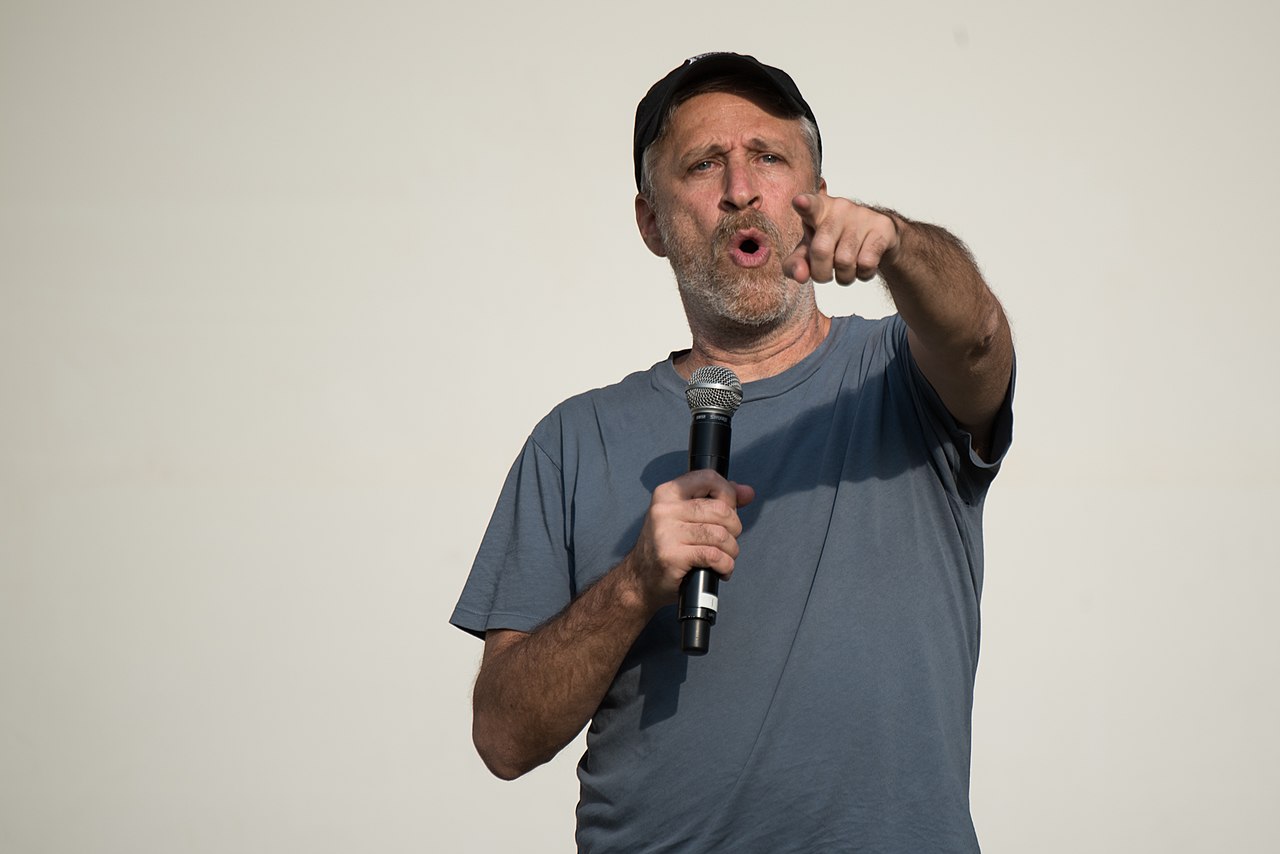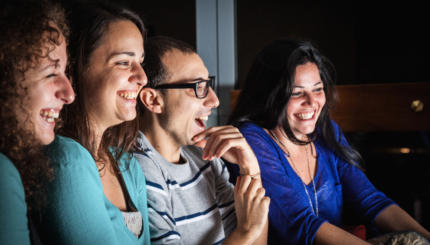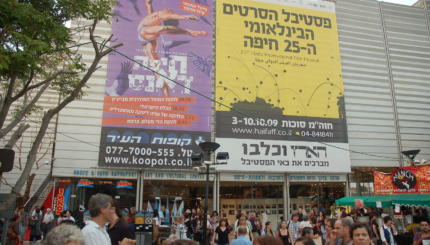There is a voice that Jon Stewart trots out on certain occasions. High-pitched, wheedling, and nebbishy, it immediately summons to mind legions of nerdy young men wearing glasses. It is less an original impression and more an homage to every contemporary Jewish comedian’s hero, rival, and guiding star, Woody Allen, the comic genius who shucked his last name while retaining his famously conflicted stance toward Judaism.
Note: This article was written before Jon Stewart left The Daily Show. For up-to-date information on Jon Stewart (and other contemporary Jewish comedians), visit our partner site JTA.
Like Allen (born Allen Konigsberg) Jonathan Stuart Leibowitz transformed himself into the more gentile sounding Jon Stewart without actually becoming any less Jewish in affect or sentiment.
Any comedian with a Jewish last name (or the remnants of one), and a literate, bookish shtick, will inevitably face the Woody comparisons. Jon Stewart’s Woody voice is a small, telling indication of his willingness to not only attack those comparisons head-on, but make it a part of his own persona. The same could be said of Stewart’s relationship to Judaism as a whole.

Help us keep Jewish knowledge accessible to millions of people around the world.
Your donation to My Jewish Learning fuels endless journeys of Jewish discovery. With your help, My Jewish Learning can continue to provide nonstop opportunities for learning, connection and growth.
In many ways, Jon Stewart is only nominally a Jewish comedian. His enormously popular Comedy Central series, The Daily Show (now hosted by Trevor Noah), is a comedic take on current events and public affairs — a sort of alternative front page for an audience who prefers Stewart to The New York Times.
Stewart rocketed to fame during the lowest years of the Bush administration, when liberal wrath at the excesses and incompetency of Republican leadership propelled The Daily Show’s brand of snarky outrage into cultural ubiquity.
The Road to The Daily Show
Born in 1962 to a middle-class Jewish family in New Jersey (his father was a physicist, and his mother a teacher), Stewart has served longer in the trenches of comedy than many Daily Show enthusiasts might be aware. Debuting as a standup comedian shortly after graduating from William & Mary in 1984, Stewart scuffled through various low-profile gigs before becoming a featured presence on MTV in the early 1990s. Graduating from writing sketches to hosting his own show, Stewart took the reins of his pleasingly lackadaisical talk show–named, conveniently enough, The Jon Stewart Show–in 1993, with B-list celebrity guests like John Stamos sharing time with the comedian’s off-kilter musings.
READ: Jon Stewart Looks Back at His Jewish Moments
The MTV series was a cable hit, eventually making the leap to syndication, where it was forced into competition with the big boys of late night. Stewart’s show flopped in its new time slot and was canceled in 1995. Following his show’s cancellation, Stewart filled his time with mostly forgettable roles in movies like Half Baked, Playing for Keeps and The First Wives Club (from which his scenes were ultimately deleted).
Meanwhile, Comedy Central had debuted a new program of its own called “The Daily Show” in 1996. Hosted by former SportsCenter anchor Craig Kilborn, it was meant to be a snarky news roundup with an emphasis on entertainment reporting. The show was popular, and when Kilborn took a job hosting CBS’ Late Late Show in 1999, Stewart was hired as his replacement. Under Stewart’s guardianship, The Daily Show brought in a remarkably gifted group of correspondents (including Stephen Colbert, Steve Carell, Rob Corddry, and Ed Helms), and shifted the focus from popular culture to politics.
The timing was ideal; with the contested 2000 election, the September 11 attacks, and the war in Iraq just around the corner. The Daily Show would tap into a growing public desire to stay abreast of current events without being bored stiff by the nightly news. The Daily Show not only has come to fill in it viewers in on the news, but also offer its own deliciously witty, rip-roaring take on the day’s events, often leaning on cleverly culled video footage to poke holes in the well-maintained façade of public discourse.
All Those Jewish Jokes
As his show’s master of ceremonies, Stewart plays the Jewish court jester, offering gleefully impolite, impolitic observations from an outsider’s perspective. The frame of reference for Stewart’s jokes, and those of his correspondents, is often a Jewish one. On one episode, Stewart compared then-President Bush’s United Nations speech castigating Iranian President Mahmoud Ahmadinejad to that of a classical Jewish mother rebuking her children: “But go ahead, burn me in effigy, for all I care…sue me for loving.”
In another episode, Stewart gleefully announced the presence of actor–and fellow Semite–Seth Rogen for that night’s taping. With Rogen’s presence, Stewart noted, “our show…will be for Passover.” Pausing for laughter, Stewart went on: “Is it Passover now? Does anybody know? Anybody? No? Is it Purim? Hanukkah? Kwanzaa?”
It was, truth be told, none of the above–although Passover was only a week away. The joke, though, was multifaceted: It was first a winking recognition of Stewart’s place near the apex of the Hollywood Jewish cabal, using the platform of his television show to usher another member of the tribe into America’s living rooms. It was, as well, an acknowledgement of Stewart’s tenuous–or mock-tenuous–grasp of his own Jewish heritage. Was it Passover? Which one was that again? The one with the candles, or the one with the fasting?
Jewish holidays are a notable preoccupation of The Daily Show, which enjoys having Stewart and his correspondents poke gentle fun at the onslaught of celebrations that remain mostly unfamiliar to Gentile America. Sukkot, according to Stewart, is defined as “a Hebrew word meaning ‘how many holidays can Jews fit into one month?’ The answer, of course, is ‘I can’t be in tomorrow. It’s a Jewish holiday.'”
Stewart is the assimilated Jew writ large, joking about raising his child to observe Christmas and before wryly noting that “Christmas blows the doors off Hanukkah.” In his Jewish mode, Stewart resuscitates the kind of awkward, neurotic Jewish-themed humor associated with USY events and bar-mitzvah instructors. The Festival of Lights, Stewart observes, “celebrates the birth of our savior, Hanukkah Harry.”
A Typical American Jew
Stewart’s is the voice of contemporary American Jewry, his own self-stated unfamiliarity with the nitty-gritty of religious observance complemented, and partially offset, by a deep-seated sense of his own roots. The Woody voice, the Jewish jokes, the constant references to the Hollywoodization of his name, these are all witty, self-congratulatory, sometimes-pained acknowledgements of Jon Stewart’s playful affection for, and occasional ignorance of, his Jewish background.
Somehow, the experience of seeing those jokes writ large, on the television screen, in close proximity to the mandarins of American politics, makes them funny all over again, no longer moldy but brash reminders of Stewart’s unapologetic Jewishness (Stewart’s having changed his last name becomes, in this mindset, less a pathetic caviling to the gentile powers that be than a personal foible, ripe for mockery).
The Daily Show becomes a strange inverse of American life, with assimilation taking place from the inside out. There is something truly charming about watching African-American correspondent Wyatt Cenac awkwardly stumble through the phrase “just because I’m goyim doesn’t mean I don’t have mechutanim” (never mind the improper use of the plural). Judaism, in Stewart’s world, becomes a cool kids’ club everyone is desperate to join.



